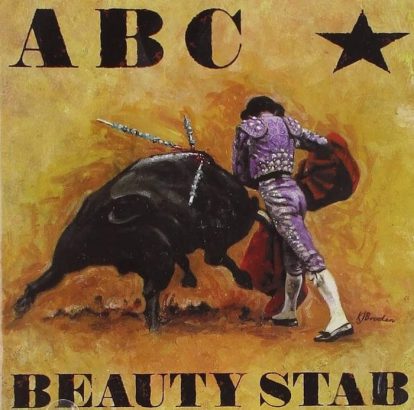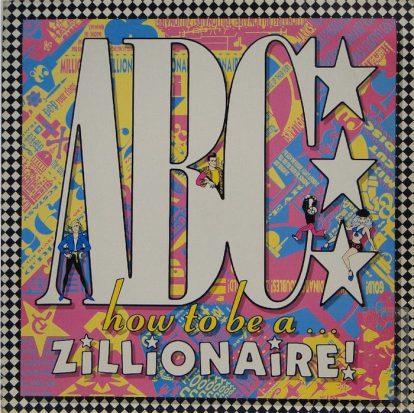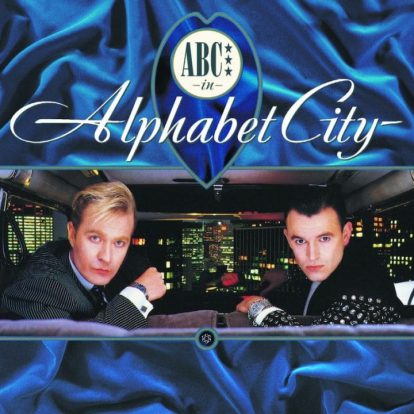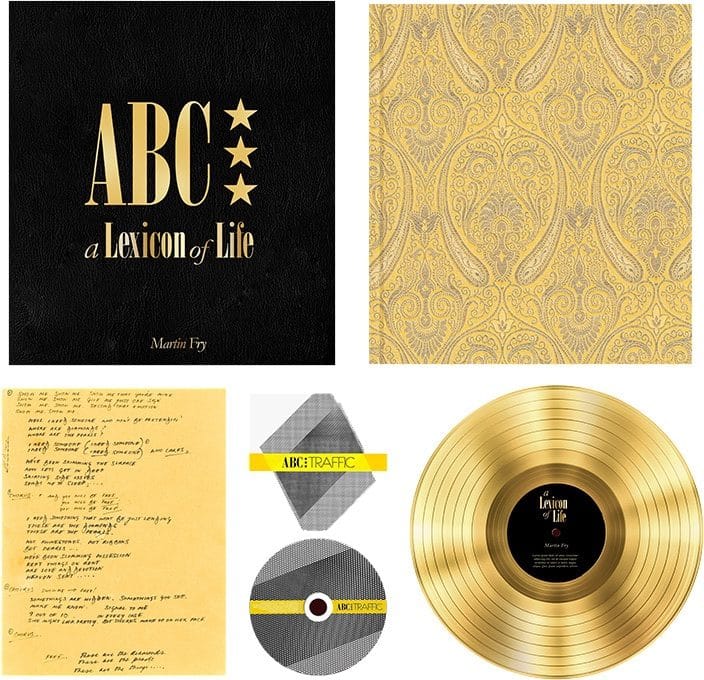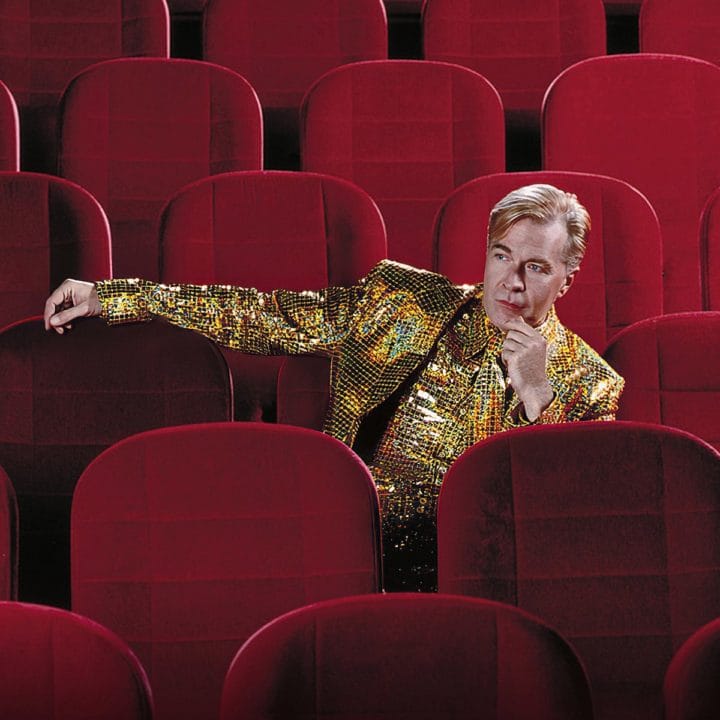
More than 40 years since becoming a star, Martin Fry tells his life story in A Lexicon Of Life. Alongside his battles with cancer and alcoholism, Martin reveals to Classic Pop of his desire to keep ABC’s sound evolving, Trevor Horn’s poor attention span… and how he had to explain Bernie Clifton’s act to Lady Gaga.
Told in chronological order, Martin Fry’s new autobiography – naturally titled A Lexicon Of Life – starts with the remarkable reminder that he’s actually from Manchester. ABC are one of the greatest Sheffield bands, yet here’s their singer writing about idolising Manchester United while growing up in Salford.
“I was blessed to grow up in Manchester,” Martin considers of his roots. “Salford is the suburbs, but I’d come into town to just wander around the city. I think that tradition still exists for young people: while you’re inventing yourself, you come into the city to buy the shoes you can’t get in the suburbs.”
Steel City
The Steel City’s charms first arrived in 1977, when Fry was studying English Literature at Sheffield University. He rhapsodises over seeing Def Leppard, The Human League, Clock DVA and The Stunt Kites, comparing the city to how Bob Dylan eulogised New York’s Lower East Side. “Sheffield was a fantastic place to be a bohemian,” he smiles. “The buses were just 10p, so you could go anywhere and feel like a king.”
Decades on, does Martin consider himself more Manchester or Sheffield? “I can’t answer that,” he counters. “If I go Sheffield, they won’t let me back in Manchester and vice versa. I’m Zelig, I can be all sorts of different people, as can we all.” He breaks into a Gallagher-esque Manc accent. “When I get near Bridgewater Hall, I do become: ‘Alright everybody, how you doing?’”
Famously, ABC began when Fry interviewed electronic Sheffield upstarts Vice Versa for his student fanzine, Modern Drugs. Future ABC stalwarts Mark White and Stephen Singleton recognised Martin’s potential when they were invited back to a party where “I started singing and making up songs on the spot, one called ‘Funky Beckett’, another was ‘Look Go Down’. Mark and Steve said: ‘Oh! You can sing – be the singer.’”
But even if he hadn’t received that invite, Fry believes he would have become a singer eventually, as he was increasingly restless about his ambitions. He recalls: “I drove my brother Jamie nuts. I had the elder brother syndrome, the Noel to his Liam. When Jamie had a band, Roundabout, I’d tell him: ‘The guitarist is great, but the bassist’s shoes aren’t right.’ Jamie would tell me to fuck off and I realised: ‘Yeah, maybe I’d better get my shit together and form my own band.’”
Northern Exposure
Much like Soft Cell up the road in Leeds, Vice Versa’s musical mission was “trying to make electronic Northern Soul records”. Martin rattles off some of the other Sheffield talent of the time: Cabaret Voltaire (“Incrediblelive”), Artery, I’m So Hollow (“Amazing”). “The competition was fierce,” he grins.
The change to ABC wasn’t as radical as it appears in retrospect. “We wanted people to keep coming to see us,” Fry explains. “Our thought was that our little audience would say: ‘Oh, they’ve changed, we need to keep going to see what’s next.’ That was it: wanting to entertain our local audience.” Their fateful idea was wanting to marry disco together with “the great British art-pop bands” such as The Cure, Joy Division and Magazine. They no longer felt part of nascent synth-pop, as Martin continues: “I understood that The Human League wanted to mix ABBA and Wendy Carlos. Impressed by James Chance And The Contortions, we were more interested in a romantic sound.
“Mark suggested the change of name. He saw we were becoming a radical dance faction, so we needed a bassist and drummer. Getting more people in, that physically changed the sound of the band.”
You’ll be familiar with what followed, though Fry’s book reminds us that ABC’s first choice of producer was Grace Jones/Thompson Twins mastermind Alex Sadkin. “The Lexicon Of Love would have sounded very different,” admits Martin. “We met Alex, who pointed out that the rhythm section on those Grace Jones records we loved so much was Sly And Robbie; that it was them who made them sound so incredible.”
Working With A Maverick
Their own rhythm section perhaps not quite as gifted just yet, ABC instead went with Trevor Horn. For Fry, one of Horn’s most overlooked abilities is his humour: “There’s an absurd side to Trevor. He’s a maverick who likes cheeky music. Two Tribes, Left To My Own Devices, Slave To The Rhythm… they’re all extreme pieces of music that are pieces of the artists’ personalities.
“Trevor’s attention span isn’t good, but that’s one of the great things about him. You have to keep him focused, as you don’t get Trevor for long. It meant we came up with mad shit just to get a smile out of him.”
Martin believes he was fortunate that his personal life was already settled. He’d met his wife Julie while still a student, at Sheffield club Penny’s, saying of her support: “We’ve gone through so many adventures. When success comes, life gets surreal. People can easily burn out from the madness and attention of it all, but Julie was a rock throughout. I’m a lucky man, because we’ve turned so many corners together.”
Of course, Beauty Stab is often cited as a textbook difficult second album. It has its charms – S.O.S. is one of ABC’s finest ballads, Love’s A Dangerous Language and If I Ever Thought You’d Be Lonely pull off their heavier funk ambitions, United Kingdom is an incisive protest anthem – but the public were hugely unconvinced.
Quite simply: why did Martin Fry want to make a protest record after the glamour of ABC’s debut? “No idea,” he admits, frown lines breaking out in waves. There’s an unusually long pause from such a garrulous talker, before he gives a good account of Beauty Stab’s intent. “I’m an obstinate, stubborn, oblique guy and, once I got back to Sheffield, I felt that record. You write songs about how you feel, and Beauty Stab is how I felt. I’m no Billy Bragg, but sometimes things have to be said.”
Crossing Rhodes
The reception to album two was summarised for Fry when, a fan of The Clash, he bumped into their manager, Bernie Rhodes, at rock star hangout The Columbia Hotel. “Bernie told me: ‘You can’t be writing protest songs. You’re a popstar. It’s like when Marc Bolan tried to do it. No fucking way. Stop it.’ I gave it back to Bernie, but he was right. He was telling me how difficult it is to evolve and change, when I thought ABC should be Queen on Tuesday and Roxy Music on Wednesday.”
Martin’s biggest regret over the album is that Trevor Horn didn’t produce it. “If Trevor had produced Beauty Stab: that’s the interesting idea of that record,” he ponders, before comparing Beauty Stab to another troubled second record. “There’s good stuff on Liverpool by Frankie Goes To Hollywood, like Rage Hard, but you get the impression they got bored halfway through. To make 45 minutes of music, there’s an intensity to it, and at least we were intense on Beauty Stab.”
Day-Glo Duo
The problems with Beauty Stab didn’t stop ABC from reinventing themselves again: How To Be A… Zillionaire!is one of the great underappreciated 80s albums, sonically fizzing and sounding as Day-Glo as the cartoon imagery created alongside it. Let’s be clear: ABC’s third album invented Gorillaz.
Part of its animated ethos was because ABC were effectively now a duo of Martin and Mark White. They drafted in American musician David Yarritu and journalist Fiona Russell-Powell, aka Eden, but the singer reveals: “David and Fiona didn’t do a lot, musically. Mark and I found ourselves as a duo, when neither of us wanted to be a duo. That wasn’t how we wanted to present ourselves, which is why we got David and Fiona in.”
To clarify: it was Britain that didn’t get …Zillionaire!. Still smarting from Beauty Stab, ABC’s British label had grown bored of them, even defacing their posters in reception. As Fry puts it: “The UK label didn’t like Zillionaire! and didn’t want it. Then, like the cavalry coming over the hill, its singles were hits in the States. It was ahead of its time, and the 12″ mixes were particularly extreme. I still sometimes get messages about how big those mixes were in hip-hop.”
Cruel Twist Of Fate
It was doubly cruel timing that, just as ABC were taking off in the States, Martin was diagnosed with cancer, in his late 20s. An offer to support Tina Turner on her world tour had to be rejected, yet just days after his Hodgkin’s Lymphoma diagnosis, ABC appeared on Soul Train. Was Martin in denial about his illness? “No,” he responds. “The reality is, you can’t not perform on Soul Train. For a guy from Salford to be invited, that’s an accolade, especially when so few white artists have been on Soul Train. I had more treatment and thought I’d recovered, but I felt like shit in New York, so I had to go back to London for more chemotherapy.”
There’s another pause, while Fry considers how much he wants to discuss his illness. He says: “I find it hard to talk about cancer, because I don’t want to sound like the only man who’s been through it. But it’s part of my story and it’s influenced me a lot. Even now, at 66, I know how lucky I am. It’s a privilege when I step onstage, because I’ll never forget what it was like to be in such dark corners.”
Musically, Martin’s recovery was most explicit in the classic hit When Smokey Sings. He touchingly describes listening to old soul singles as therapy, explaining: “I was wondering what the future held, finding solace in Motown. It really brought home how the illness affected me.”
Alphabet City
Accompanying LP Alphabet City tried to merge ABC’s previous three records, with Chic’s Bernard Edwards co-producing two of the songs “because then Mark and I could officially steal every Chic move we had.”
ABC’s last classic album with Mark White, 1989’s Up is a phenomenal house record. Fry remembers Mark delightedly telling him about “a club under a gym in London Bridge”, with Shoom and then the Haçienda spilling into suitably euphoric pop.
But trying to follow Up ultimately ended the duo. They met a succession of dance greats – David Morales, Frankie Knuckles, Steve ‘Silk’ Hurley, Derrick May, Larry Heard – but none stuck as potential producers because, as Martin accepts: “We ran out of artistic steam.” The songs weren’t there, and ABC instead finished Abracadabra themselves with Dave Bascombe.
After a decade, Mark White left in 1991. It’s sad there’s been no reunion since, but the reality is simple: “Mark just wanted to do something else,” offers Fry. “There was no fist fight or rolling around in the street, Mark simply said: ‘That’s it, I’m done, project over.’
“ABC was intense. We lived those records. You don’t just read about house music and try to emulate it: you have to know it and feel it. After six records in eight years, we were ready for a sabbatical. When Mark told me, I thought for three milliseconds about stopping, too, before realising, no, this is what I want to do.”
Exorcising Demons
After ABC’s next album Skyscraping, Martin realised by his 40th birthday in 1998 that he was an alcoholic. He’s honest that having more spare time with ABC out of favour contributed to his drink problems accelerating.
“I grew up in bars,” he reflects. “Making records in the 80s, I really was on a campaign, because I was putting on so many shows around the world. Drinking wasn’t an issue. Once the phone stops ringing, that’s when it’s hard.
“Once I hit 40, it was time to change my life. I was looking in the mirror, thinking: ‘Who are you? Why do all these bad things keep happening?’ I knew I had to take on responsibility for myself.” Sober now for 26 years, he smiles: “I’m Mr AF – I’m into the alcohol-frees. So many great things have come from getting sober.”
Reunited with The Lexicon Of Love drummer David Palmer, Fry considers 2008’s eighth LP Traffic to be “ABC’s great lost album”, his sobriety feeding into songs including Validation. He’s frustrated it’s so obscure that it’s not even currently available on streaming, vowing: “I’m going to fix that.”
ABC came full circle in 2016 with their most recent album, The Lexicon Of Love II, a record that “exorcised a lot of demons” by returning to the original’s lushness.
Alongside his life story, Martin intended A Lexicon Of Life to explain his drive to write songs. “The reasons why anyone wants to write a song fascinates me,” he says. “I love plucking things from thin air to try to have the whole world singing along. And I get to say things that I never would in real life. All these years on, it’s still a strange existence – and I still love it.”
The Look Of Life
Martin Fry – A Lexicon Of Life is published by A Way With Media in Collector and Classic editions.
Rather than a regular tome, Martin’s memoir A Lexicon Of Life is an art book full of photos and facsimile pages from his notebook. The £295 Deluxe Edition even comes bound in gold lamé cloth from the same costumiers who make his onstage gold tuxedo.
Fry confesses that, at first, the book looked a little too glossy. “I started off with photos where I looked immaculate,” he laughs. “Then my son told me: ‘You look like a fucking clothes model. You don’t need all of the photos to look like that.’ It was good to be reminded to check my ego.”
Instead, while some pictures are still by top photographers such as Gered Mankowitz and Andy Earl, there are more off-duty photos of ABC looking ruffled.
Martin’s other challenge was how many showbiz anecdotes to include. As he puts it: “I’ve got my namedropping stories, but I’ve tried not to use many of them.” An exception is the incredible tale of Fry sitting next to Lady Gaga at a royal charity show, where she witnessed Bernie Clifton for the first time.
“Bernie’s legs were out of his ostrich, while Lady Gaga was going: ‘What is this?’ I was telling her under my breath: ‘It’s his act.’ You wouldn’t know if you hadn’t grown up on it, would you? I couldn’t really explain the glory of Bernie, but at least I reassured Lady Gaga that, yes, this was all part of the show. That was one I had to include.”
Order Martin Fry – A Lexicon Of Life here
Read More: Classic Pop’s Top 40 80s debut albums
Classic Pop may earn commission from the links on this page, but we only feature products we think you will enjoy.

